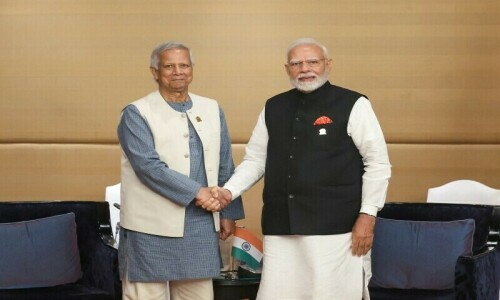AS it was mentioned last week, on March 25, 1975 the world received the tragic news of the assassination of Saudi Arabia’s King Faisal. On March 31, the Sindh Assembly paid glowing tributes to the memory of King Faisal as ‘one of the greatest champions of Islamic unity, a statesman of world stature, a far-sighted leader, and a symbol of strength for the Muslim world’. The house conducted no other business that day and was adjourned after adopting the unanimous resolution as a mark of respect to the memory of the late monarch. When proceedings began, the speaker of the assembly, G S Kehar, told the house that two identical condolence resolutions were received on March 25 and 27 from the Deputy Leader of the house Abdul Waheed Katpar and the Opposition’s Zahoorul Hasan Bhopali. According to rules, the one received earlier was to be tabled. Mr Katpar’s resolution read: “The house places on record its profound sorrow on the tragic and untimely death of His Majesty King Faisal bin Abdulaziz.”
Another royal figure from the Middle East was in the news that week. On April 2, it came to light that Prince Shaikh Sager bin Homaid of Sharjah — who studied at Sindh Madressahtul Islam from 1952 to 1954 and did his matriculation from Karachi — was on a private visit to Pakistan. In an interview, the prince said ever since his schooling in Karachi in the 1950s, some good schools had been set up in Sharjah where foreign languages were taught.
Holding workshops is also a form of teaching. On April 2, the Rafi Peer Theatre Workshop began a play at the Pak American Culture Centre (PACC) titled Culture Culture — An Exercise under the auspices of the Arts Council. The play, which was to run until April 7, was an original work in Urdu penned by Salman Shahid with two sequences by Perin Cooper. Reviewing the drama, a critic wrote: “It provides more than stringent moments of satire and humour with a sequence of related vignettes of contemporary society which compel those of us who are part of it to take a second look at ourselves and our values. The production and stage techniques by Salman Peerzada, the eldest son of Rafi Peer, who has won a place for himself in the film world in England, is quite up to expectation.”
From one form of expression to another. On April 5, the Chief Minister of Sindh, Ghulam Mustafa Jatoi, inaugurated an exhibition of paintings, mosaics and drawings by the distinguished artist Gulgee at the Arts Council. Earlier, Gulgee had called upon the Sindh government to buy paintings of artists and display their work at public places in order to promote fine arts. Mr Jatoi assured his government’s full support in promoting the arts in the province. While witnessing the exhibition, the chief minister expressed particular interest in a portrait of King Faisal which Gulgee had done in lapis lazuli. On March 29, talking to Dawn at the preview of the display, Gulgee said that he had especially been commissioned to do the portrait. In that connection, he had the honour of meeting King Faisal a few times.
Published in Dawn, March 31st, 2025














































